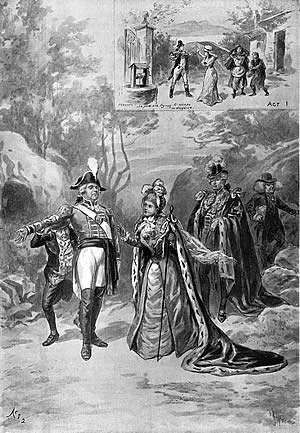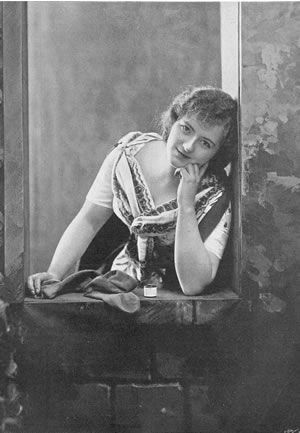 |
 |
||||||

 |
| The Emerald Isle at the Savoy Theatre From "The Illustrated Sporting and Dramatic News", 4 May 1901. |
"THE EMERALD ISLE."
Is this "another injustice to Ireland"? British tyranny, represented by the Speaker of the House of Commons, recently decreed that Irish members might not make speeches in Parliament in the language of their country, he most probably being moved by the reflection that they would not be understood. And now Captain Basil Hood has invented a Lord Lieutenant who has determined that if the Irish language is spoken at all it shall be spoken with an English accent. Certainly the gentleman named has provided some compensating consolation for while poking a little fun at "the foinest pisinthry in the worruld" he has kept store of it for application to the English aristocracy, that is never so noble as when American blood runs in its veins. It is all most excellent fooling; and Ireland, like England, and Scotland, and America, and all the world, will keenly appreciate it and enjoy it when comes the chance to see and hear the new comic opera, The Emerald Isle or The Caves of Carrig Cleena, brought out at the Savoy Theatre on Saturday with the most gratifying and unmistakable success. There was, it will be readily understood, something like a feeling of sadness among the audience in the beginning for the Master whose music there was eagerness to hear was no more, and the manager who with him had contributed so greatly through long years to the world's delight, had only just gone to join him in the great majority. But there was the touch of the vanished hand, and there was the sound of the voice that was still; and in the end there was joy in the thought that in his latest work the genius of Arthur Sullivan had lost nothing of its brilliancy and its beauty. And there was further gratification in the conviction that no mistake was made when Mr. Edward German was selected to finish what Arthur Sullivan had so well begun. Freshness and fancy characterise the music throughout. Those whose good fortune it was to be present on Saturday were stirred by the choruses, were soothed by the sweet and dainty grace of the ballads, and were greatly exhilarated by the indispensable jig, the repetition of which was instantly demanded.
The story is one of a hundred years ago. Fresh from his college education in England there has returned to Ireland young Terence O'Brian, whose heart is filled with rebellion and love of the Lord Lieutenant's only daughter, the Lady Rosie Pippin. His endeavours to communicate with the lady are frustrated by the watchful sentry at her father's gates, and do not prove successful until there comes to his assistance one Professor Bunn—a gentleman of many accomplishments—lecturer, conjuror, teacher of elocution, hypnotist, and quick-change artist. He hypnotises the sentry: delivers young Terence's missive to his lady love, and then makes it his business to inform the Lord Lieutenant that the rebel leader is not far off. Arrangements for the capture of Terence and his followers are at once made. A raid is ordered upon the caves of Carrig Cleena. When it is found that the soldiers to be employed in this business are from Devonshire, saucy Molly O'Grady, who has heard of their superstition, suggests they shall all be frightened out of the fulfillment of their errand; and Professor Bunn, who has been compelled to join the rebel ranks, is ordered to show his talent and versatility in making them stay away. And so the Professor, who really has been brought over to teach the English language in Irish infant schools, assumes various disguises to make the military believe that if any one amongst them is caught by the witch of Carrig Cleena he will remain a prisoner for at least fifty years. The ruse succeeds for a time; but presently the soldiers find their courage and Terence, taken prisoner, is in danger of being shot. His deliverance is promised when the ever resourceful Bunn is able to show that the Lord Lieutenant, being an English nobleman, is half American, and has been rebelled against in mistake; while objection to Terence's union with Lady Rosie is dispelled by revelation of the fact that he is of royal descent, having had an ancestor in Brian Boru.
 |
| Louie Pounds as Molly From "The Illustrated Sporting and Dramatic News", 1 June1901. |
The piece, which was perfectly staged and dressed, was splendidly played, from principals down to the meanest super; and there were honours in abundance and well deserved for Mr. Jones Hewson, highly amusing as the Lord Lieutenant, who always speaks in blank verse; Mr. Rous, as Dr. Fiddle, his very funny chaplain; Mr. Robert Evett, who as Terence sang and acted his way into the general favour; Mr. Henry Lytton, who scored brilliantly as Murphy, the blind fiddler, who is not really blind, but has taken to his profession because there was no other open to him, and the blind fiddler practice had been in the family for years; Mr. Walter Passmore, who as Professor Bunn was a veritable tower of strength to the production; Miss Rosina Brandram, who makes the most of her scant chances as the Countess of Newtown; Miss Isabel Jay, who sang sweetly as Rosie, and Miss Louie Pounds, who came right to the front with her clever impersonation of Molly O'Grady. Useful work in other parts was done by Messes. Leon, Earldon, Crompton, and Pindar, and the Misses Blanche Gaston-Murray, Lulu Evans, and Agnes Ireson. The piece and production were productive of much enthusiasm on the opening night, and a long run may with confidence be predicted.
[Text from "The Illustrated Sporting and Dramatic News", 4 May 1901.]
Page modified 6 November 2020